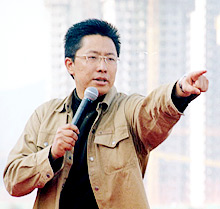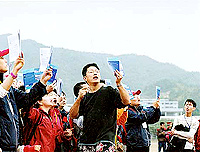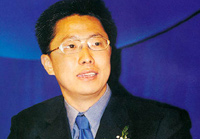Li Yang a Crazy Talker
 There’s nothing in traditional Chinese philosophy about a man whose greatest success in life was abject failure. In fact, there is nothing traditional whatsoever in a man who isn’t afraid to tell you, “I love losing face.” Which is just as well, considering his approach to motivating China’s laobaixing (ordinary folk) into speaking English is to stand up in front of tens of thousands of strangers and follow the unconventional method of shouting and gesticulating slogans and catchphrases.
There’s nothing in traditional Chinese philosophy about a man whose greatest success in life was abject failure. In fact, there is nothing traditional whatsoever in a man who isn’t afraid to tell you, “I love losing face.” Which is just as well, considering his approach to motivating China’s laobaixing (ordinary folk) into speaking English is to stand up in front of tens of thousands of strangers and follow the unconventional method of shouting and gesticulating slogans and catchphrases.
The man in question is none other than Li Yang, founder of Crazy English and language guru extraordinaire. A national obsession in China, with a cult following across Asia of 20 million, Li Yang is no ordinary man. Lecturing regularly to crowds of 20 to 30,000, and visiting on average 15 cities a month, Li Yang has aspirations that far outweigh any aspirations he may have had when he flunked his mechanical engineering degree at Lanzhou University over 15 years ago.
With his trademark methods and adventurous approach to learning a language, Li Yang will insist he is an uncomplicated man with basic values and traditions… but do not be fooled. His performances are not restricted to the stage or large crowds. Over a simple bowl of Xinjiang noodles, Li Yang will enthusiastically divulge his newest venture, that of introducing the Chinese language to 300 million people worldwide with his aptly named “Crazy Chinese.”
Lingua Franca
 The idea of motivating millions of Chinese people with self-confidence and the ability to speak English were not initial objectives behind the founding of Crazy English. Far from it. The fundamentals of Li Yang’s inspirational techniques for remembering English words (shouting the words out loud) were for purely selfish interests, that of allowing Li Yang to preserve some dignity after failing thirteen exams in his first year of study.
The idea of motivating millions of Chinese people with self-confidence and the ability to speak English were not initial objectives behind the founding of Crazy English. Far from it. The fundamentals of Li Yang’s inspirational techniques for remembering English words (shouting the words out loud) were for purely selfish interests, that of allowing Li Yang to preserve some dignity after failing thirteen exams in his first year of study.
The physical aspect of language figures large in Li’s learning philosophy: “Any language is easy if you learn it with your mouth,” he enthuses. “You cannot learn to be a successful swimmer in the classroom.”
In what Li refers to as “tongue muscle training”, (a self-devised combination of listening, reading, speaking, writing, and translation, with grammar books put aside), he not only achieved the second highest mark in the school when he took the Level 4 National English Exam for college students four months later, but after presenting a lecture to fellow classmates on how to speak good English, he founded what is today, the best known English language program in China.
Fifteen years later, and Crazy English is today run by a staff of 140 in Greater China, Korea, and Japan.
 So just how does Li Yang successfully motivate the average, timid and skeptical Chinese to stand up in front of thousands of strangers and shout: “On a bus! In a car”, “I want to be somebody someday”, or “You need a vacation”?
So just how does Li Yang successfully motivate the average, timid and skeptical Chinese to stand up in front of thousands of strangers and shout: “On a bus! In a car”, “I want to be somebody someday”, or “You need a vacation”?
Charisma, charm and good looks probably have a lot to do with it, but Li Yang insists that the key is getting the audience to lose themselves and to just relax. But as if to reassert his unfaltering personal charm, he adds with a cheeky smile, “Korean housewives love me. I don’t know why.”
While audiences may love him, what he gives in return is a dose of tough love: a recent lecture in Shanghai saw him yell at the crowd, “I don’t like you!” And then adding into the shocked silence, “Strong people don’t get hurt.” And at a recent convention of communist party officials in Beijing he yelled, “Relax! You’re just mayors!”
“I give them a hard time and they give me a hard time,” admits Li from the end of his wooden table in the empty Muslim restaurant a few blocks off Shanghai’s glitzy Nanjing road. He himself eats nothing while encouraging us to eat more. With our mouths full, it is Li Yang who does all the talking. “Don’t take me as China.” Li Says. “Take me as Asia.” Because Crazy English isn’t just for the Chinese.
Li believes all Asian countries are facing the same problem of speaking “terrible”, “stupid” English. So it is not surprising that Crazy English would be popular in other Asian countries. “What is surprising,” he adds, “is that Koreans would want to learn from a Chinese.”
The key is that Li is not just selling a language: he’s selling a self-help venture based on what he says were the failings of his own parents. Born in Urumqi, Xinjiang Province in 1969, Li says the greatest failure of his parents and the Chinese schooling system in general was a culture of feeding children a lack of confidence. “Things haven’t changed much in the past thirty years,” Li adds.
Catchy Phrases
“If you are strong enough, you are your own god”, “Get up every morning believing it’s going to be a nice day”, “The best preparation for tomorrow is doing your best today,” are just some of his favorite catchphrases. Or the most modest of all – “Don’t admire Li Yang – borrow from Li Yang.”
Li Yang encourages people to be unique, and make the most of opportunities as they present themselves. “Embarrassment is a motivation to become better,” is just another of his self-proclaimed ideologies. Which is why, he believes, people in jail have so much to live for. “Jail is the best time to study,” says Li. “These people have lost everything, and are ready to start a new life.” Not surprisingly, Li’s latest idea is to give performances in China’s prisons. There’s nothing more satisfying, he explains, than being told that a jailed person has just finished one of his Crazy English text books.
Li Yang uses education to promote education. One lecture in the cities can take up to Y1 million, and in June, Y20,000 was donated to two schools in Ningxia. As if to re-enforce his commitment to leading a simple life, Li tells us how donating to education in China’s rural areas is one way he is overcoming his desire to ‘conquer the need for money’.
 But despite all his recent fans, Li has his detractors; and he reserves special scorn for Zhang Yuan, the director behind the documentary style film Crazy English (2000), in which a camera crew escorted Li around the country filming him at his height. The film itself gained international recognition, and was the first of Zhang Yuan’s films to be screened in China, “But,” says Li, “the movie was stupid. It was not a real documentary because it’s intention was to please a Western audience.”
But despite all his recent fans, Li has his detractors; and he reserves special scorn for Zhang Yuan, the director behind the documentary style film Crazy English (2000), in which a camera crew escorted Li around the country filming him at his height. The film itself gained international recognition, and was the first of Zhang Yuan’s films to be screened in China, “But,” says Li, “the movie was stupid. It was not a real documentary because it’s intention was to please a Western audience.”
Zhang’s film portrayed Li as a pseudo-religious buffoon, cavorting across the stage spouting phrases to all and sundry. The portrayal, Li feels, was harsh, to say the least: “I hate people who pretend to be noble – to be god.”
Certainly, Li defies categorization in many ways – in one breath describing himself as a “loser” and a “psycho”, and in the next a social person giving the education system a boost. His heroes are “real” men like Nelson Mandela and Kim Dae-Jung, and so it is easy to see just why Li aspires to be like them. They are “men who can admit their weaknesses”. In what appears to be genuine sympathy, Li adds, “Clinton should have admitted his affair. It was the shame of America to demand the details, and for that, Clinton should have given it to them.”
The occasional self-help book aside, and with dreams of eventually retiring to the Yunnan countryside when he’s finished teaching, Li Yang insists there is still plenty to do. There are plans to open offices in the USA and Europe to promote “Crazy Chinese” which will follow closely along the methodology of Crazy English. “Master the method and you can use any book,” he says. His prediction that in the 21st century, people with a mastery of both English and Chinese will be in great demand around the world, has prompted Li Yang to believe Crazy Chinese can look forward to the same successes as its English counterpart. Whether foreigners will embrace Li’s ideology as enthusiastically as Asians have is yet to be seen, but in the mean time, his advice to foreign friends is to just forget the tones and “enjoy speaking bad Chinese”.
Not bad for a failed mechanical engineer; and he’s a genius at marketing his methods. “It’s about the right attitude, and good publicity,” he acknowledges. “I never promote shortcuts,” he says, “learning a language is a lifelong process. It’s about the right direction and the right way to do things.” And he adds over a still untouched plate of pilaf, “My way is the only way.”
(cityweekend.com December 26, 2003)
via: http://www.china.org.cn/english/NM-e/83370.htm
作者:麦子
原文链接:Li Yang a Crazy Talker
李阳疯狂英语版权所有,如需转载请注明出处。
